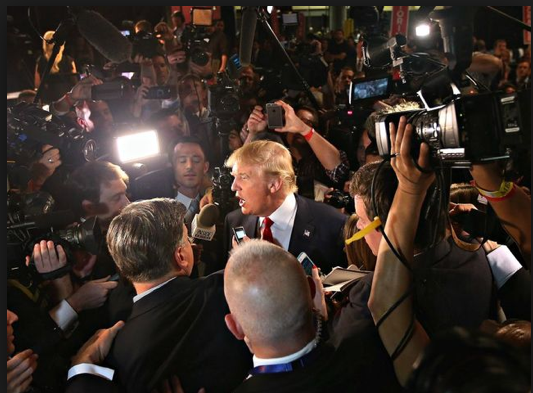The latest victim of Donald Trump’s presidential campaign is news media–and it is the one of most dangerous transgressions to take place during this year’s presidential race.
After attacking Mexicans, Muslims, Democratic presidential nominee Hillary Clinton, and so many others, he has called media “crooked,” “dishonest,” and even lacking “credibility.” These comments have arisen again in light of Trump’s claim that he didn’t support the Iraq war in the early 2000s, despite news media underlining that there is hard-core evidence of him saying that he did. In addition, Trump is ONLY NOW ending the blacklist of news media outlets that he has accumulated and, if he becomes president, plans to “open up” libel laws to sue news organizations when they write “false, negative, and malicious articles” about him.
(Just to point out: Trump has enjoyed, according to one study, about $2 billion worth of free coverage by the media since his announcement to run for president)
So why is Trump’s attack on news media dangerous? Because he could sincerely be a threat to the freedom of speech and he promotes a distrust in crucial news outlets, which could instead bring forward more unreliable news sources. While his attacks certainly affect media and journalists, Trump’s attacks are, more importantly, influencing his supporters.
The best demonstration of his influence can be seen in the series of tweets from a reporter who attended a Trump rally in North Carolina. The hateful remarks by Trump supporters towards journalists are chilling, not only because these threats feel substantial towards the lives of reporters, but also to the truth journalists are dedicated to communicate. If impartial journalists are delivering solid facts but people staunchly ignore them, then it perpetuates unfairness, ignorance, and hate. News media and what they stand for, are thus stone-walled. And the truth? Rejected.
Which brings us to the other danger brought about by Trump: the news media seems to be very politically partial since the beginning of August…and Trump is being covered in a negative light. Possibly tired of the lies spewed by the Trump campaign, CNN actually fact-checked Trump in real-time. Buzzfeed News released a memo that says its reporters can call Trump a racist. Trump’s vague and suggestive comment about the Second Amendment and Clinton was covered by countless of news organizations and majority of them interpreted Trump’s comment grimly. The Washington Post, which was famously blacklisted from Trump’s rallies, was literally unfazed and undeterred by being blacklisted.
Of course, it’s not like news media have the best of relationships with Clinton. But the media that had arguably built and created Trump’s presidential nominee status has shifted from being incredulous at Trump running for office to being critical at Trump running for office. Many news writers actually note how the negative coverage of Trump is unusual for presidential election coverage. Ezra Klein, editor-in-chief of Vox, wrote an article analyzing the possible reasons for this kind of coverage, listing reasons ranging from “how most of media today is liberal (but not Democratic) to reporters actually hating how Trump continually lies.”
But I think Matt Taibbi, liberal political writer of The Rolling Stone, makes a crucial and sad point about the future of news media, post-Trump: “The model going forward will likely involve Republican media covering Democratic corruption and Democratic media covering Republican corruption.” Trump’s campaign and his attack on media has possibly created a different news media culture. People may not look towards news media for impartial coverage, but for particular, polarizing reports. While these reports could possess some truth, it may not be the entire truth on the entire situation, which isn’t good.
Each person will have their own political leanings and news coverage may be communicated through different lenses depending on the reporter/organization, but news media is supposed to be impartial. They’re not supposed to be one-sided and they shouldn’t have a political agenda. They should be unrelentlessly investigative and putting out the facts while they cover events and people. This is how trust, respect, and fair judgement is cultivated because the unfiltered truth is given to viewers to inform them, not manipulate them. The moment a population dismisses news media for biased coverage, it is an affirmation to be ignorant to the truth.

